June 2020 Independent Eating and Drinking Newsletter
| Independent Eating and Drinking are Wonderful |
 |
| June Newsletter Topics: |
|
| Subscribe to Newsletters |
Thickening Liquids and Solids for Bolus Control
For those who have swallowing difficulties, thickening their food and drink can help reduce the likelihood of aspiration or choking. Until recently thickening agents were considered pretty much equal, despite different commercial products being thickened in different ways, even though some clinicians and caregivers had a preference for one type over another. However, recent research using the science of rheology to study the properties of thickened liquids provides insight into how fluids thickened with different thickening agents can be of help with swallowing without choking or aspirating.
Rheology, which is a branch of physics, is the study of the deformation and flow of material which takes place when the material is under pressure. There are many industries where rheology is applied, for example, metal, plastics, medical, and food. Food rheology studies the properties of foods and contributes to the understanding of the consistency of food. Is it a solid, a gel, (like some jams are), a jelly (as is Jello), or a liquid, or an emulsion (as syrup is)? The consistency of many foods significantly impacts their shelf life, as well as their visual appeal. The mixture of components that add up to be the final product, and their properties, define the texture and viscosity of the final product. In normal cooking this would be the recipe, but in food manufacturing it is not as straight forward. Food rheology a decade ago contributed to the measurement of the viscosity of the item being made. Now the science has evolved to include instrumentation and equipment that is able to measure many aspects of the food being developed. With the advancement of the technology a greater understanding of food texture and its structure has evolved thus allowing us to understand how and why foods and liquids behave as they do when eaten.
This advancement in the science has allowed research to be conducted into food thickeners used to support people who have dysphagia. Some interesting findings have been reported and one of the phenomena of note is the finding that xanthan gum thickener (used in several commercially available thickening products), provides a bolus that will hold together with a viscosity that allows it to stretch, or shear, as the bolus moves slowly into the pharynx. When a bolus thickened with modified starch thickener is swallowed under similar circumstances it has a faster transit time into the pharynx and is more likely to break into pieces rather than remaining in a single bolus. This indicates that the cohesiveness of the thickened food or liquid is impacted by the type of thickening agent used.
This finding might lead you to select thickening products that use xanthan gum thickener, however, you should note that similar products, made by the same manufacturer, might use either xanthan gum thickener or modified starch thickener, therefore it is recommended that you check the ingredients before selecting a product.
It is important to understand that much of the current research that is being conducted evaluates thickened liquids or soft solids of different levels of thickness. How thickness is defined has been globally standardized to make it easier for scientists and users throughout the world to be able to communicate. This work was conducted by the International Dysphagia Diet Standardization Initiative (IDDSI). Information can be found at their website.
| MEALTIME PARTNERS SPECIALTY CUPS | |||||
| Even though the majority of products offered by Mealtime Partners are hands-free, we offer a few cups that must be hand held to be used. These are cups that offer special delivery of the liquid that is drunk from them. | |||||
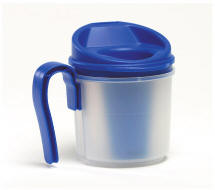
|
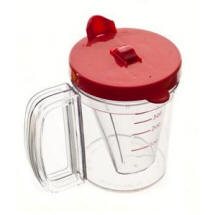
|
||||
| The Provale Cup is suitable for individuals who are at risk of aspiration when drinking thin liquid. It controls the amount of liquid that is delivered each time the cup is tipped up to the user’s lips. The user receives the equivalent of a small teaspoonful of liquid (5cc) each time the cup is tipped up to take a drink. |
The Thickened Liquid Cup was designed for people who require
liquids that they drink to be thickened.
It has a fully adjustable flow control that regulates the
continuous output of liquids. It also is designed to provide
liquids without the cup being tipped at an angle greater than 60
degree. The cup can be completely emptied without tipping it
higher than that angle. |
||||
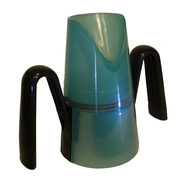 |
|||||
|
The RiJe Cup dispenses adjustable portions of liquids from
3cc to 15cc. This cup is suitable for individuals who have swallowing
disorders that are changing – either improving or deteriorating. For example,
those who have had a stroke and are recovering their ability to swallow safely,
or those who have a degenerative disease like amyotrophic lateral sclerosis
(ALS). To purchase any of the three cups described above, simply click on the appropriate picture above. To learn about all Mealtime Partners drinking products, click here. And, to talk to a Mealtime Partner representative, please give us a call at 800-996-8607. |
|||||
There are several different methods of providing a drink: a cup can be placed at the user’s lips and tipped; a bottle can be used in the same way; or, a container with a straw can be offered. However, great caution should be used when offering someone a drink from a bottle. The inclination when drinking from a bottle, particularly a bottle with a spout top, is to lift or tip the head up and backwards. This head position poses a risk to the drinker because it exposes the airway to a possibility of the liquid “going down the wrong way”. Additionally, while the bottle is against their lips, the user is required to swallow the liquid continuously, rather than one swallow at a time. Repeated swallows without a break between each swallow, significantly increases the risk of choking. Although providing a drink from a bottle results in less spillage than a cup, it is recommended that bottles not be used, because of the increased risk of choking.
For a person who cannot lift a cup to their mouth, using a straw or tube that is linked to a source of liquid is the preferred method for their access to hydration. They will then to be able to drink at any time they wish. (Because a straw is a type of drinking tube, to avoid redundancy, we will use the term "straw" in the following discussion to mean any type and length of drinking tube.) Using a straw makes providing a drink much simpler and safer, and is essential for independent drinking. However, to be able to use a straw, the user must be able to form their lips around the straw to create the necessary vacuum. The user's lip closure capability requirements depend a lot upon the softness or rigidity of the straw. When selecting a straw, how much the tube will shape to the user's lips, and how much lip control the user will require to seal their lips around the straw (so that a vacuum can be developed), must be considered. (There are many varieties of straws and choosing the correct one for the individual is very important.
Another important consideration when
choosing a drinking system is the user’s ability to suck. If they
have good strong suction, a drinking system can be mounted on the
back of a wheelchair or a bed head. Alternately, a drink holder can
be mounted in front of a wheelchair arm-rest and a long straw can be
utilized by the user to take a drink without using their hands or
having assistance. Unfortunately, many people who are unable to pick
up a drink with their hands, also have a limited ability to suck and
require a short straw. This reduces the mounting possibilities for a
drinking system to being near the user's mouth, which is usually in
front of the user, whether they are sitting in a chair at a table,
are in bed, or sit in a wheelchair, with or without a lap tray.
Another example of
an independent drinking system is the Mealtime Partners Front
Mounted Drinking System, shown below. It is one of the easiest
drinking systems to use because it brings the drink very near the
user's mouth, thus reducing the suction required for it's use. It
has an advantage over the table or lap tray mounting mentioned
above, because it is held firmly in place and cannot be knocked
over. The Front Mounted Drinking System was developed by Mealtime
Partners to provide access to fluids to our customers who use
wheelchairs but who have a very limited range of head and trunk
movement, and, who additionally, have weak suction. The system
consists of a heavy-duty flex arm that has a clamp on one end and a
cup holder on the other. Several lengths of flex arms (6, 12, 18, 24
and 30-inch) are available so that this drinking system can
accommodate many different individual sizes. Clamping is available
for metal rails (like manual wheelchairs or hospital beds) and
various wheelchairs with slide rails (sometimes referred to as
T-Slot tracks) for mounting accessories. It is basically a moveable
cup holder that will hold it's position once clamped to a secure
base object. The pictures below show the Front Mounted Drinking
System attached to both manual wheelchairs and to a wheelchair
(lower-right) with a slider rail mounted under the arm. They are
shown holding different types of containers. The Front Mounted
Drinking System comes with a Koozie for holding smaller containers
(as shown in left-side pictures).
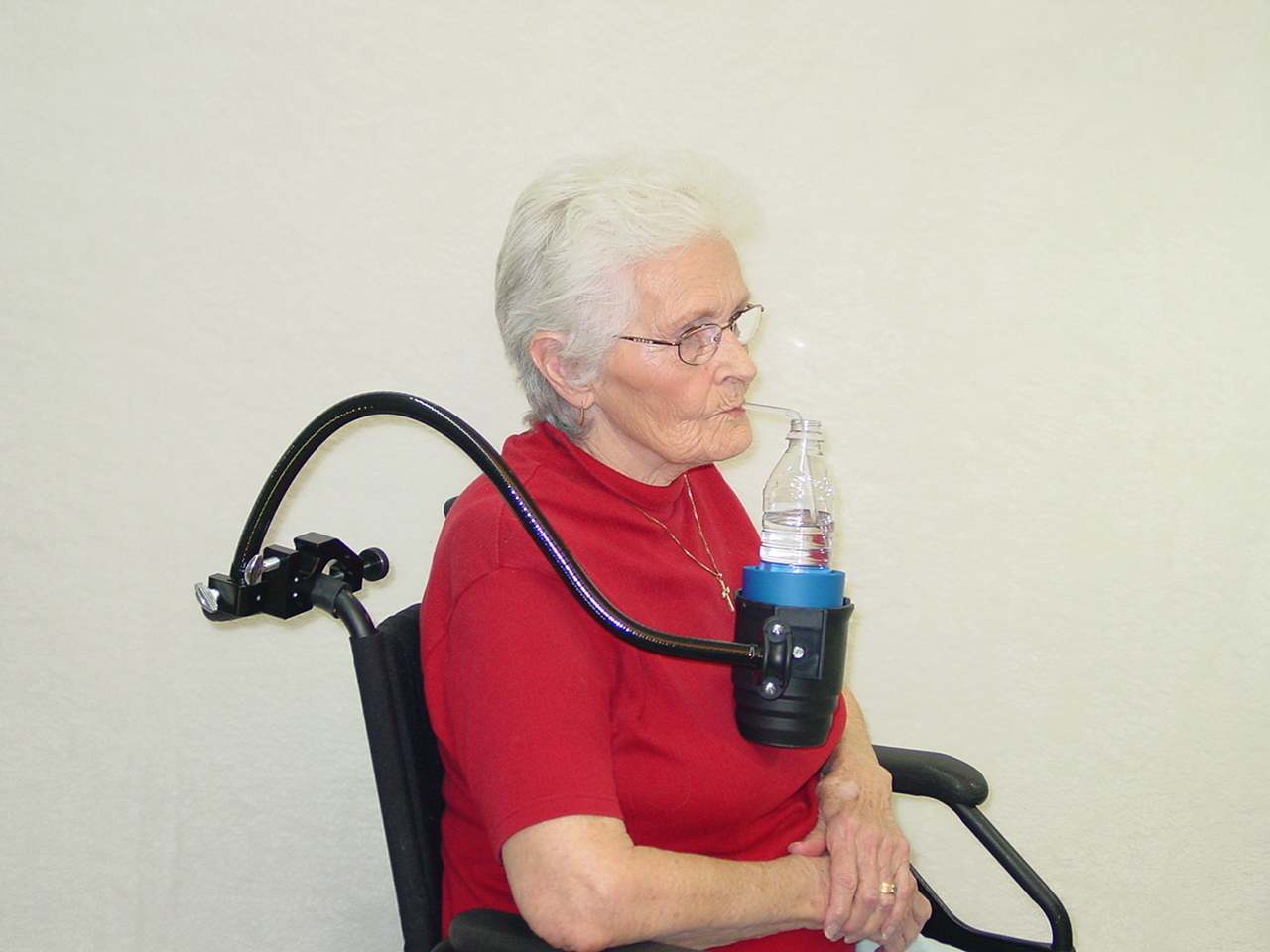 |
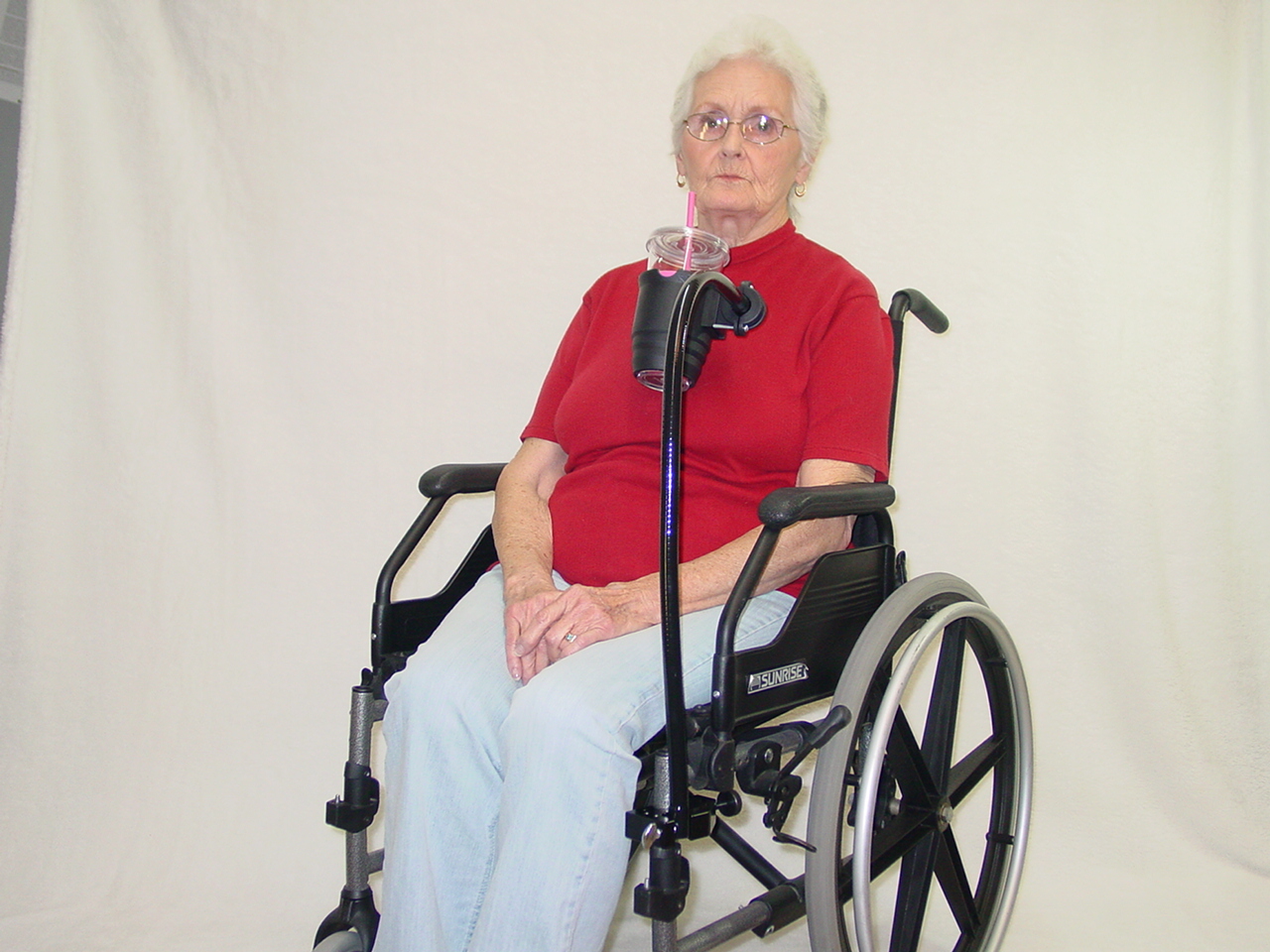 |
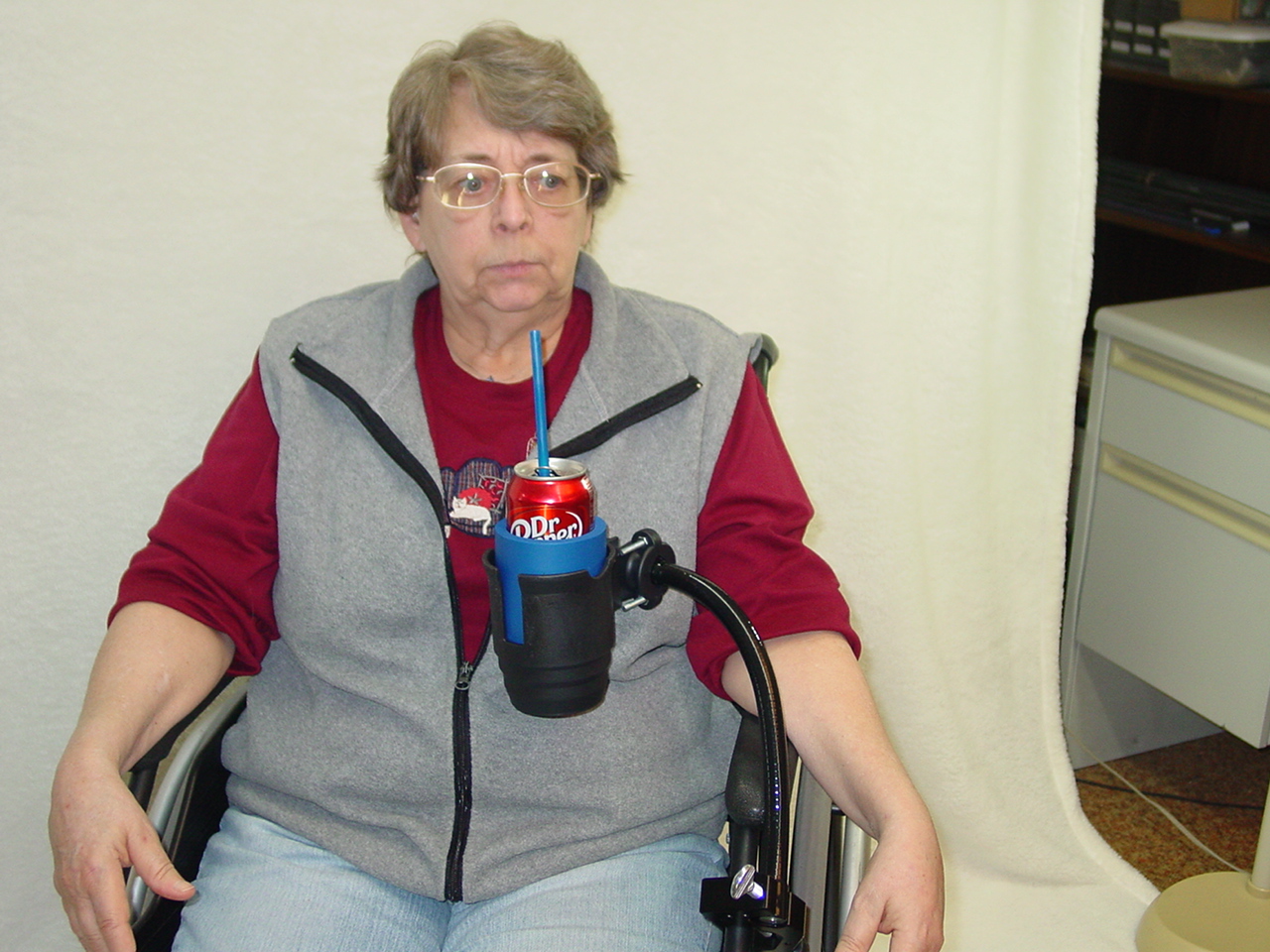 |
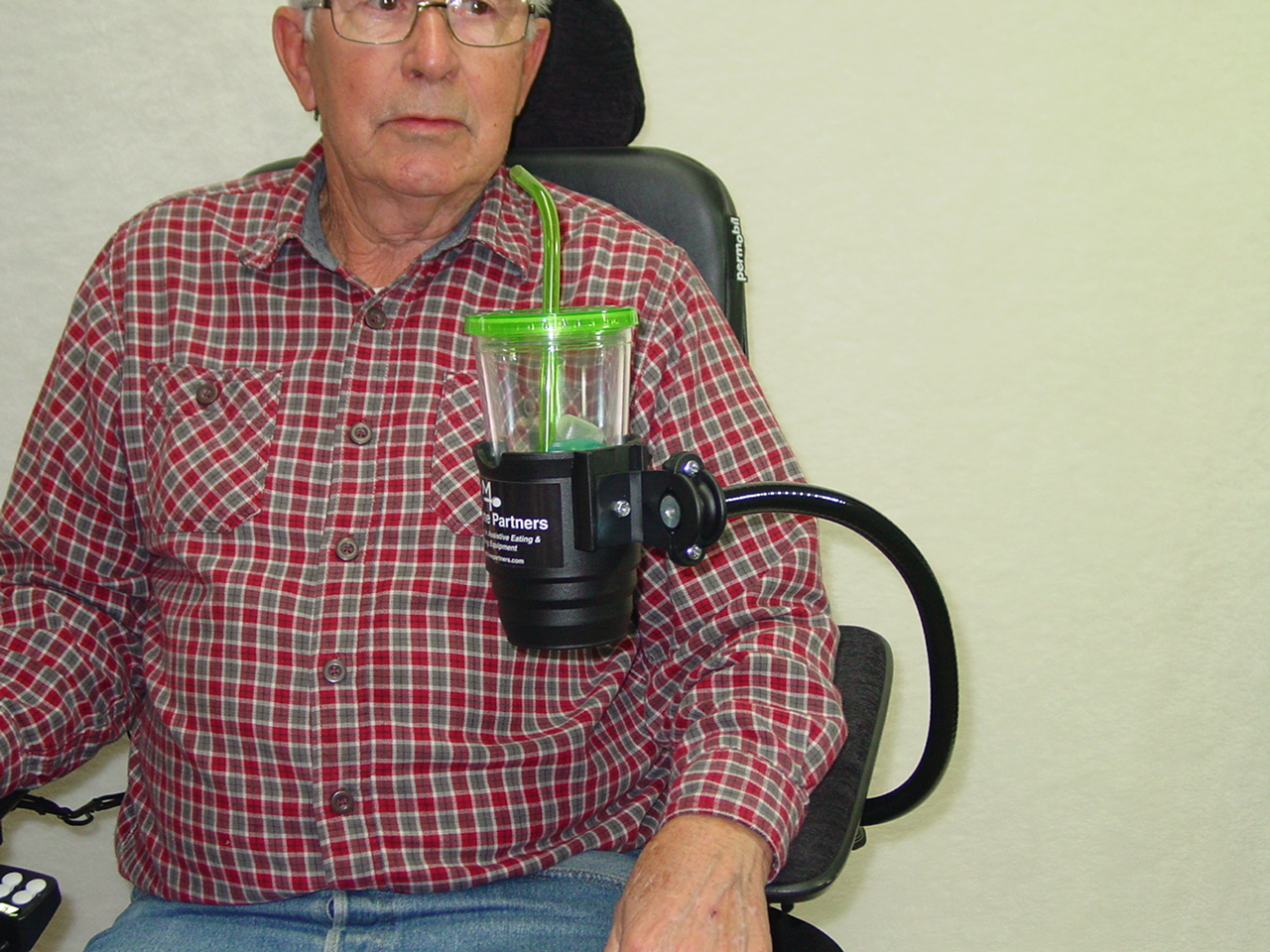 |
Other drinking
systems are available that locate the liquid on the back of the
wheelchair, which may be preferred because it locates the liquid
container out of the way. They can contain more liquid for longer
periods of independence, but the user must be able to create more
suction to use them.
In conclusion, it is recommended that everyone
who needs assistance with drinking, be provided an independent
drinking system. Systems that use a straw are simple and safe and
with the straw positioned near the user's mouth, permits independent
drinking for almost everyone. Just be sure to select a drinking
system meeting the user's physical capability for suction and that
the straw is compatible with their lip closure/pucker capability to
permit sealing the lips around it. For more information about
Mealtime Partners Drinking System, including additional
considerations for selecting the appropriate drinking system, click
here.
1. Dycem® - manufactured by Dycem Limited in the United Kingdom. This unique material prevents slipping without the need for permanent fixing. Dycem is non-toxic and is easily washed, with a multitude of uses in clinical, home and work settings. Commonly used under plates and glasses, while eating; also great for holding desk top activities in place.
|
Did you know? Did you know that the Federal Drug Administration (FDA) has approved a video game as a treatment for attention deficit hyperactivity disorder (ADHD)? EndeavorRX has been developed and tested by Akili, a Boston based company. It is designed for use by children 8 through 12 years of age and requires a doctor’s prescription to be played. The game requires the operator to drive a “flying saucer” through an obstacle course avoiding dangers and collecting targets. The game should be played for about half an hour a day, 5 days a week, for a month. The goal is to complete 5 missions in the given time. Once they are complete, the game will not allow play to continue. The game is designed to challenge a child to concentrate on multiple tasks at the same time. It is a unique way to treat children with ADHD without drugs. |
Click here to subscribe to the Mealtime Partners Newsletters
Please send comments and suggestions to newsletters@mealtimepartners.com
Copyright © Mealtime Partners, Inc. 2020
All rights reserved.
Mealtime Partners Website Navigation: